
Ethics & Advocacy
Press freedom shouldn’t be something student journalists have to fight for — but too often, it is. I have faced multiple attempts at censorship, administrative interference, and restrictions on access to information. Instead of backing down, I pushed back, educating myself and my staff on press rights, advocating for policy change, and holding my newsroom to the highest ethical standards. I lead the Voices Unbound advocacy campaign, which urges Alexandria officials to enshrine an independent student press in school board and city policy.
Beyond legal advocacy, I have also ensured Theogony operates with professional journalistic integrity, adhering to fact-based, ethical reporting even under pressure. Additionally, I have worked to strengthen media literacy within our newsroom and community, ensuring students and readers engage with reliable journalism.

I asked many questions to lawyers at the Student Press Law Center at the National High School Journalism Convention. Photo/NHSJC
Advocacy
At multiple points during my tenure, Theogony faced direct censorship attempts and administrative interference. I first experienced this after publishing my second-ever article, which was about how my school district would not comply with guidance from the governor that discriminated against transgender students. My headline was "ACPS Not to Comply with Youngkin Anti-Trans Policies," but shortly after publishing, my adviser received a phone call from a district administrator saying she should change the headline because it was "too harsh." After a lengthy class discussion we decided to keep the headline as it was, as we had the freedom to do so at that time. But since then, as we've published several investigative pieces, attempts to censor or make information difficult to access have exploded.
This school year, after an investigative series, my school district proposed a policy of prior review and restraint, where all "articles of interest" have to be pre-approved by school and even district officials.
Instead of backing down, we are stood up for our first amendment rights and launched the Voices Unbound movement.
To counter this assault on our free reporting, I partnered with other student journalists at my school and the non-profit Student Press Law Center to create a policy prohibiting administrative censorship without cause, protecting student journalists and staff-advisers from retaliation, and establishing boundaries between independent student publications and school district public relations staff.
I first secured endorsement of Voices Unbound from local organizations and officials, including:
-
The majority of Alexandria's city council
-
State Sen. Adam Ebbin
-
The Alexandria City Public Schools Student Representatives to the School Board
-
The Alexandria City High School Student Government Association
-
The Alexandria City High School Solidarity Council of Student Unions
-
More than 1,400 residents or interested parties in an online petition
Then, I secured the endorsement of larger organizations, including:
-
The Virginia Capitol Correspondent's Association
-
The National Press Club
All the while, I secured media coverage in a plethora of news organizations, including:
After a rampage of incensed community members used the Advocacy Dashboard I created to send hundreds of emails to elected officials, speak more than 20 times at school board meetings, and protest in solidarity with Theogony, the school board announced that it would table its censorship proposal for the time being. The school board has still not committed to adopting Voices Unbound, and my work continues.

A separate frivolous takedown request, and my response below.
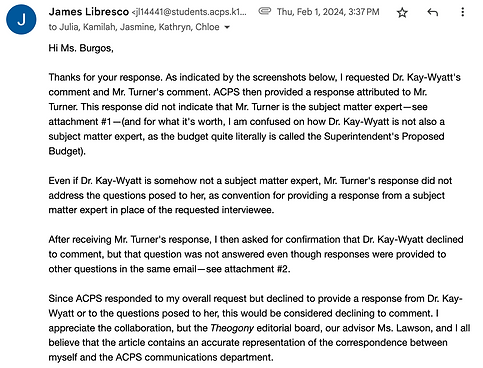

Dozens of community members protested in the school board chamber with the Theogony team and me, and more than 20 spoke in the public comment period.

Our advocacy made it to the front page of the Washington Post's Metro section.

Peter Baker, the Chief White House Correspondent for The New York Times, was one of several prominent journalists to share our story on social media.
What Is Voices Unbound?

Our slide deck breaks down the situation with visuals.

I worked hard to secure endorsements from more than a dozen groups.
Defending Theogony’s independence has never been about a single incident — it has been a long-term effort to secure permanent protections for student press rights in Alexandria.
Voices Unbound is modeled on New Voices laws that have been passed in 18 states. Over the past several months, I have led an intensive behind-the-scenes advocacy campaign to get it passed, bringing our case to school board members, legal experts, student groups, and national journalism organizations.
Voices Unbound includes the following protections:
-
Student journalists are restored full 1st amendment protections under the Tinker Standard.
-
ACPS and student journalists follow the NSPA code of ethics
-
ACPS can’t censor content unless it is libelous, an invasion of privacy, obscene, illegal, or creates a clear and present danger or disruption to operation of the school.
-
Staff adviser can give administration a prior warning for content they think meets the exceptions above
-
The adviser should advise, but the final decision of whether content (that doesn’t meet exceptions) is published is up to the student editors
-
If content is libelous, obscene, etc. and is blocked from publishing, students can appeal that decision to superintendent and then to the school board, which will hold a hearing
-
District PR team cannot interfere with student publications' school-based operations
-
District cannot discriminate against student publications based on viewpoint
-
Students own the work they create
-
No punishing students or advisers, or withholding program funds, for following the school board policy.
-
ACPS cannot be held liable for content
The entire Voices Unbound Policy is available here.
A plethora of organizations are backing Theogony in our fight.
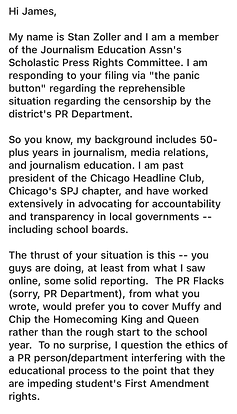

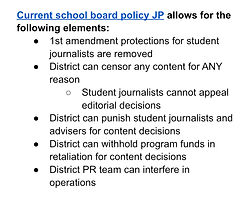
These screenshots from our masterdoc show the differences in the current school board policy and Voices Unbound.
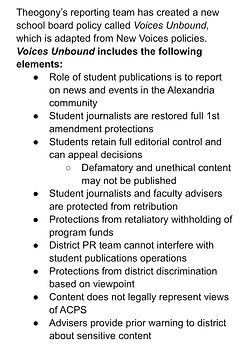
As part of this process, I had to learn about the intricacies of media law and then teach them to my staff, requiring deep dives into court cases and hours reading analysis.

I sent many similar text messages to student and city leaders to secure support.
An original draft of Voices Unbound and its advocacy campaign on the whiteboard after a class discussion.
Education
Ensuring that Theogony maintains high editorial standards has required more than just following ethical guidelines myself — it has meant training my staff to make responsible, legally sound editorial decisions. As Editor in Chief, I have prioritized staff education in press rights, ethical journalism, and legal risks, ensuring that every member of our newsroom understands both their rights and their responsibilities. In fact, the very first thing you see when entering the newsroom is a giant print-out of our code of ethics.

Our code of ethics is always front and center.
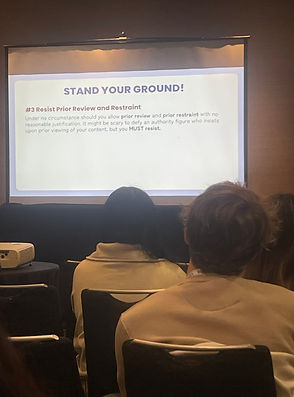
This presentation, by students from California, allowed me to fully understand the dangers of prior review. Now, we keep in contact about censorship.
I have helped educate our staff on:
-
The NSPA Code of Ethics – emphasizing accuracy, fairness, and minimizing harm.
-
The legal risks of journalism – covering libel, defamation, privacy laws, and prior restraint.
-
How to handle sensitive reporting – ensuring that when covering controversial or high-impact issues, we balance public interest with journalistic responsibility.
-
How to challenge censorship – training staff on their First Amendment rights, how to respond when administrators attempt to interfere with reporting, and how to document instances of press suppression.
In addition, we attended multiple presentations about ethics and media law, from SPLC lawyers, experiences students, and Cathy Kuhlmeier herself.
These trainings have helped prepare our staff to both report the news and defend their right to do so.

Our staff got to see Cathy Kuhlmeier speak at a presentation!
Decision Making
Beyond formal training, I have worked with my editorial team and professional newsrooms to apply ethical principles to real-world decisions, including:
-
Deciding how to cover sensitive topics.
-
When we reported on a change to the bell schedule, emotions initially ran high. But I ensured we reported the facts while avoiding biased framing or unnecessary speculation.
-
-
Determining when to publish without a school comment
-
Officials frequently delay responses or refuse interviews. I have worked to establish the fine line of when we move forward with publication, ensuring we remain fair while not allowing stonewalling to block important reporting.
-
-
Ensuring fair and accurate representation in controversial stories
-
Our coverage of the school's budget process led to pressure to remove statements about our superintendent declining to comment. We stood by factual reporting while ensuring that multiple perspectives were fairly represented.
-
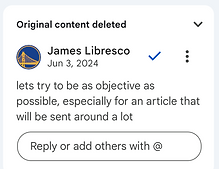
A comment on the bell schedule article.

When my school district attempted to receive questions in advance and provide alternate interviewees, I remained firm.
Accountability

After a community member notified us of an error in our reporting, we issued a correction.

A strong, independent press must be transparent and accountable—not just to the public, but to itself. I have worked to ensure Theogony upholds high standards of accuracy and fairness, reinforcing our credibility and trust within the community. Before publication, every article goes through a rigorous fact-checking process, including:
-
Multi-source verification – ensuring claims are backed by multiple sources or official records. If someone makes a claim we make sure to verify it with at least one other source before publishing. Sometimes, we wait to get more information from additional sources.
-
Cross-editorial review – all articles are edited by at least three people who check for factual accuracy, fairness, and potential bias. Some articles, especially investigative stories, are edited by up to seven people before publication.
-
Clear corrections policy – if an error is made, we issue a transparent correction to maintain credibility, even if it doesn't reflect on us positively.
Beyond internal accountability, I have ensured Theogony holds those in power to intense journalistic scrutiny.
-
Publishing documented refusals – when officials delay or refuse comment, we state it in our reporting rather than letting the story die.
-
Fact-checking official statements – when school officials downplay or contradict facts, we respond with evidence-based reporting.
-
Tracking past statements and policy changes – maintaining records to compare actions with public messaging.
Through these efforts, I have helped establish Theogony as a newsroom that not only fights for press freedom but also earns the public’s trust through responsible, transparent journalism.

When the governor declined to comment on my article, I still published it.
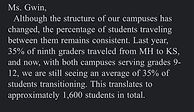
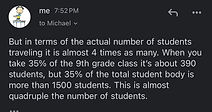
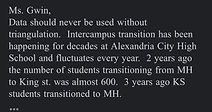
A series of emails between a staffer of mine and an administrator. I'm very proud of how she fact-checked him.
News Literacy
In addition producing strong journalism, I have worked to ensure that students, staff, and the broader school community are equipped with the tools to engage critically with news and media. In an era where misinformation spreads rapidly, understanding how journalism works — and how to distinguish fact from fiction — is more important than ever.
One of the most effective ways to promote discourse and media literacy is by giving readers a voice. I expanded Theogony’s Letters to the Editor and comment sections, ensuring that students, teachers, and community members could:
-
Respond to our coverage, challenging viewpoints, sharing personal perspectives, or offering additional context.
-
Engage in civic discussion, using our platform to talk about issues beyond the school community.
-
Experience firsthand how journalism operates, fostering a deeper understanding of what makes a strong argument, how sources are used, and how facts are presented.
In addition, I set up a way for readers to submit tips, with the goal of showing the community that we are not just an outlet for PR-based school news but an independent newsroom willing to pursue real issues.
I've also worked to combat misinformation and media bias. With social media shaping how students consume news, misinformation and bias are constant challenges. I have worked to help our audience better understand how journalism works and how to evaluate news critically. Some of my key initiatives include:
-
Using social media to break down complex news topics, ensuring that students can quickly grasp key issues without falling into misleading narratives.
-
Training staff to identify misinformation, equipping Theogony’s reporters with skills to fact-check sources, recognize biased framing, and verify claims before publication.
-
Explaining journalistic processes to the public and providing them with the full picture, such as our editing process and what ethical guidelines we follow.

Our pinned post on Instagram.


A community member offered a rebuttal to our editorial in its comment section, causing another student to respond.
This Instagram post combatted a claim without evidence by community members that transportation times were increasing.

Our "About Us" page provides insight into reporting processes. Note: some of the bullet points above have now changed.